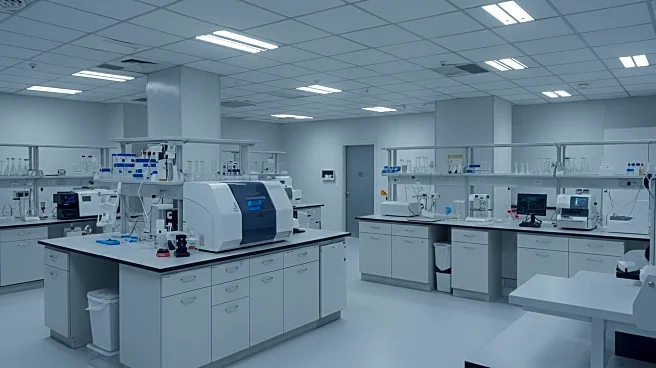What's Happening?
Sterling Bay has listed the only completed building at the Lincoln Yards site in Chicago for sale. The 285,000-square-foot tower, located at 1229 W. Concord Place, was intended to be a key component of a life sciences complex but remains unoccupied. Despite initial optimism for the life sciences sector, the building has failed to attract tenants. The sale is being managed by commercial real estate firms Savills and Eastdil Secured, who are marketing the property as suitable for various uses, including commercial and medical offices. Sterling Bay's broader vision for Lincoln Yards included a $6 billion development with residential towers, retail spaces, and public land, but high upfront costs and a downturn in the life sciences industry have hindered progress.
Why It's Important?
The sale of the vacant life sciences building highlights the challenges facing the commercial real estate market, particularly in the life sciences sector. The post-pandemic decline in venture capital funding has led to increased vacancy rates, impacting developers like Sterling Bay. This situation underscores the difficulties in executing large-scale urban development projects, especially when initial financial projections are disrupted. The outcome of this sale could influence future investment decisions in Chicago's real estate market and affect the city's ability to attract and retain life sciences companies.
What's Next?
JDL Development and Kayne Anderson Real Estate are negotiating to purchase the northern half of the Lincoln Yards site, with plans to rename it Foundry Park and develop a smaller, more walkable community. This could include up to 3,000 housing units, ranging from single-family homes to affordable housing. The success of these negotiations and subsequent development could reshape the future of Lincoln Yards, potentially revitalizing the area and attracting new investments. Sterling Bay's decision to sell the southern section remains uncertain, as negotiations have not yet resulted in a deal.
Beyond the Headlines
The challenges faced by Sterling Bay at Lincoln Yards reflect broader trends in urban development, where ambitious projects must balance financial feasibility with market demand. The shift in focus from large-scale developments to more community-oriented projects may signal a change in how urban spaces are designed and utilized. Additionally, the life sciences sector's struggles could prompt a reevaluation of investment strategies and priorities within the industry.








